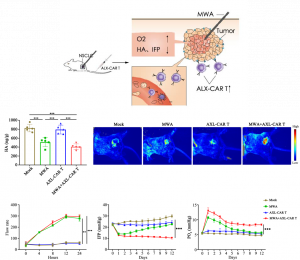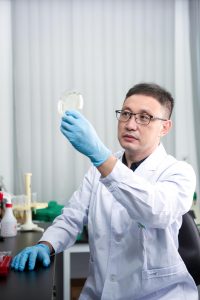A collaborative project led by Zhao Qi, associate professor in the Faculty of Health Sciences (FHS), University of Macau (UM), and Zhang Zhenfeng, professor at Guangzhou Medical University (GMU), has revealed that remodelling tumour microenvironment by microwave ablation can enhance the anti-tumour effect of chimeric antigen receptor (CAR) T cells. This technology can be used to improve the ability of a patient’s immune system to fight non-small cell lung cancer (NSCLC). This is a major breakthrough in the treatment of solid tumours with CAR T cells. The research results have been published in the internationally renowned journal Nature Communications.
Adoptive cell therapy of CAR T cells is an innovative strategy for cancer treatment. The therapy uses synthetic genetic engineering to insert a CAR gene that recognises cancer cell antigens into T cells of the patient’s immune system, turning them into CAR T cells to treat cancer. Although CAR T cell therapy has been successfully approved as a clinical treatment of haematological malignancies, the therapeutic effect in solid tumours is not significant. A previous research shows that ALX protein is highly specifically expressed in NSCLC and can be a target for CART cells to treat NSCLC. However, the complex immunosuppressive tumour microenvironment and the lack of tumour-specific targets are the main obstacles hindering ALX-CART cell therapy.
Microwave ablation, which uses electromagnetic waves to kill cells, has been widely used clinically to treat tumours. In view of this, the joint research team conducted a study on the combined treatment of microwave ablation and AXL-CAR-T cells on NSCLC. The study found that microwave ablation enhances the initiation, invasion, persistence, and tumour suppressive properties of AXL-CAR-T cells in NSCLC tumours by remodelling the tumour microenvironment. Meanwhile, the mitochondrial oxidative metabolism of tumour-infiltrating CAR-T cells is increased, which can effectively improve the efficiency of solid tumour treatment. The team believes that the strategy of reshaping the tumour microenvironment is extremely important for enhancing the anti-tumour effect of CAR T cells. The research results provide a theoretical basis for the synergistic therapy of microwave ablation and CART cells and show that ALX-CART cell immunotherapy has the value of clinical transformation.
The corresponding authors of this study are Prof Zhao and Prof Zhang. FHS PhD students Yang Shuo and Fu Shengyu also contributed to this project. The study was funded by the Science and Technology Development Fund of the Macao SAR (File No: 0043/2021/A1 and 0002/2021/AKP), National Key R&D Programme of China (File No: 2019YFA0904400), and UM (File No: MYRG2019-00069-FHS and MYRG2022-00143-FHS). The full version of the paper can be viewed at https://www.nature.com/articles/s41467-022-33968-5#Ack1.
| Source: Faculty of Health Sciences | |
| Media Contact Information: | |
| Communications Office, University of Macau | |
| Albee Lei | Tel: (853) 8822 8004 |
| Cathy Cheang | Tel: (853) 8822 8009 |
| Email: | prs.media@um.edu.mo |


